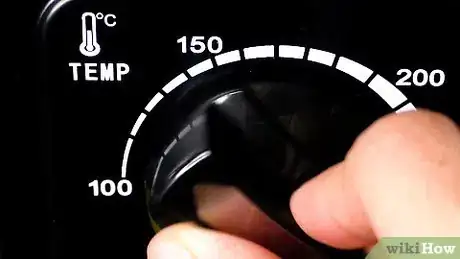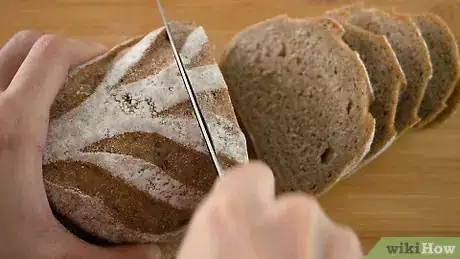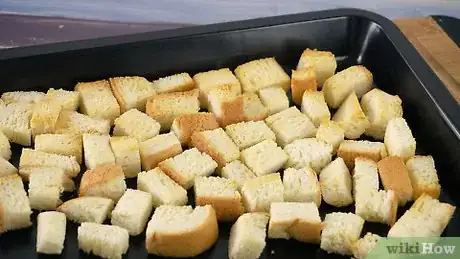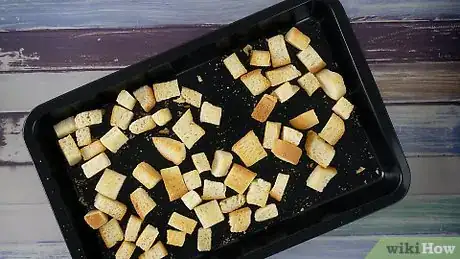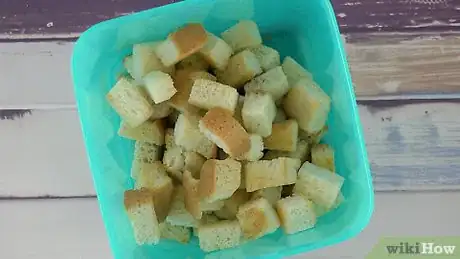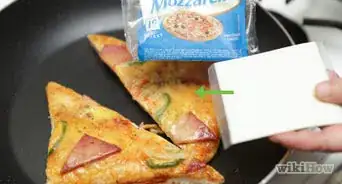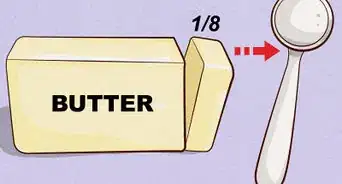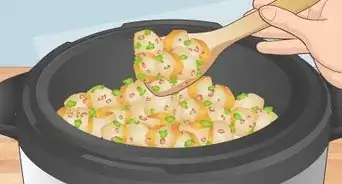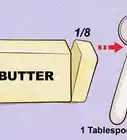This article was co-authored by wikiHow Staff. Our trained team of editors and researchers validate articles for accuracy and comprehensiveness. wikiHow's Content Management Team carefully monitors the work from our editorial staff to ensure that each article is backed by trusted research and meets our high quality standards.
There are 11 references cited in this article, which can be found at the bottom of the page.
The wikiHow Video Team also followed the article's instructions and verified that they work.
This article has been viewed 300,328 times.
Learn more...
Oven-drying bread is a useful trick to learn to prepare a key ingredient for many recipes. Dried bread can be used for dishes from soups and stuffing to bread pudding. Drying fresh bread is easy to do and gives you a way to repurpose old slices of bread as they stale. All you have to do is cut up some fresh slices of bread and bake them until they’re golden and crispy. Then, store them until you’re ready to use them as a component in one of many delicious and filling recipes.[1]
Steps
Cutting the Bread
-
1Preheat the oven to 250 °F (121 °C). Before you start preparing the bread, get your oven up and running. The cutting process doesn’t take very long. Also, bread is delicate, so keep the oven set to the lowest possible temperature to avoid scorching it.[2]
- Higher temperature settings can dry the bread faster. It isn’t a bad idea if you’re hoping to make the bread super crispy or are cooking bigger chunks. However, it increases your chances of burning smaller pieces.
-
2Cut the bread into 1⁄2 in (1.3 cm) slices if you’re using a whole loaf. If you're using a whole loaf or something you baked yourself, you will need to break it down a little first. Make as many slices as you think you will need for your recipe. Try to keep the slices as uniform as possible so they dry evenly later.[3]
- An average slice of bread equals about half a cup (17.50 g) of cubes or a third of a cup (30 g) of breadcrumbs.
- Pre-sliced bread is perfectly fine to use and will save you a little time.
Advertisement -
3Cut the bread into 1⁄2 in (1.3 cm) cubes. Lay the slices of bread flat on a cutting board, then break them down with a sharp knife. Cut each slice vertically into strips, then slice horizontally to turn the strips into cubes. The cubes don’t have to be exact, but try to keep them as close to the same size as possible.[4]
- Leave the crust on the bread. It doesn't affect the finished product, so there is no need for the extra cut unless you really want it gone.
- The 1⁄2 in (1.3 cm) cube size is perfect for stuffing and most other recipes that use dried bread. You can cut the bread differently if you wish, although that may affect how much time it needs to dry in the oven.
Toasting and Storing the Bread
-
1Spread the cubed bread across a metal baking sheet. Use a shallow baking sheet such as a cookie sheet, distributing the bread across it in a single layer. Since you’re drying the bread out, you don’t have to worry about it sticking, but you can put a baking mat or piece of parchment paper down if you wish. Make sure the bread cubes aren’t stacked on top of one another before you put them in the oven.[5]
- If you have room, leave a little bit of space between each piece for better browning. All you need is about 1⁄4 in (0.64 cm).
- The bread needs to be spread out in a layer so each cube gets the same amount of heat. If you’re making a large batch, you are better off getting a second baking sheet than trying to fit everything onto a single one.
-
2Check the bread cubes after toasting them for 10 minutes. Slide the tray onto the center rack in the oven for maximum air circulation. Since you’re using such a low temperature, the bread isn’t likely to burn. Still, keep an eye on it and don’t let it sit in the oven for longer than needed.[6]
- Note that the exact cooking time will vary depending on your oven and the heat setting you use. Also, larger chunks of bread take longer to dry.
- If you’re using multiple baking sheets, consider rotating their positioning after about 10 minutes. Test the bread before taking it out of the oven, leaving the softer batch in for longer if it needs the extra time.
-
3Take out the bread cubes when they turn crunchy and golden brown. When the bread is done drying, it will feel hard to the touch. Make sure the bread is fully dry before you take it out of the oven for storage. Give it extra time in the oven if it feels soft.[7]
- Bread is completely dried when it is crunchy and slightly golden brown. If your bread cubes are not dried after 10 minutes, return them to the oven for up to 30 minutes. Remember to check on the bread every so often so it doesn't burn.
-
4Flip the bread over and bake it again if it is still soft. Give the pan a good shake and turn all of the cubes over onto their softer sides. Bake them at the same temperature for 5 to 10 minutes until all the pieces are solid and browned. Keep a close eye on the bread the entire time so it doesn’t burn.[8]
- If you’re worried about the bread burning, try turning off your oven and leaving the door open. Let the bread sit there in the heat for 10 to 15 minutes. You can always turn the oven back on if the bread feels underdone, but you can’t go back once it is burnt.
-
5Remove the dried bread and let it cool for at least 10 minutes. Once the bread is at the perfect consistency, set the baking tray aside. Find an out of the way spot in your kitchen where you can leave the bread exposed to the open air. Wait for it to feel cool to the touch before attempting to store it or use it.[9]
- If you have a cooling rack, you could transfer the bread to it. It’s not really necessary and it’s hard to fit a lot of small cubes on a rack, but it can help if you’re in a hurry.
-
6Store the dried bread in sealed containers for up to 1 week. You don’t need to do anything special in order to store dried bread. As long as you have resealable plastic bags or containers, you’re good to go. Dried bread is fine at room temperature or in the refrigerator. Consider labeling it with today’s date so you know when it was made.[10]
- Dried bread can be frozen, but put it in a freezer-safe container first. It lasts at least 2 months there.
Using Dried Bread in Recipes
-
1Break the dried bread up if you need breadcrumbs. If you have the oven-dried bread in a plastic bag, have fun smashing them by hand or with something hard, like a rolling pin. The easier way is to put them in a food processor, although it isn’t quite as fun. Break down the bread so the crumbs are about the size of a grain of rice. Fresh breadcrumbs have a variety of different uses.[11]
- For example, you could use the breadcrumbs in meatballs or in meatloaf. They keep the meat juicy and give it a lighter, more consistent texture.
- Breadcrumbs are useful as a topping on many dishes. Add it to macaroni and cheese, for instance, or use it to bread chicken cutlets.
-
2Cook the cubes in broth if you’re making your own stuffing. Repurpose a loaf of bread to make a delicious stuffing without all of the preservatives. For a basic recipe, sprinkle the bread cubes with herbs like sage and thyme before drying them in the oven. Then, moisten them in chicken broth along with cooked onions and celery. The stuffing goes well with turkey and all sorts of other meat and fish.[12]
- Try using about ¾ teaspoon (0.60 g) of both thyme and sage along with ½ teaspoon (2.46 g) of sea salt and ¼ teaspoon (0.57 g) of black pepper. Coat the baking sheet in about 2 US tbsp (30 mL) of olive oil to mix the bread in the seasoning.
- Add a light amount of broth, just enough to moisten the bread. For instance, 1 cup (240 mL) is often enough, but it depends on how much bread you’re using. Adding too much broth makes the bread soggy.
-
3Turn dried bread into croutons for soups and salads. Take the crust off the bread when you slice it into cubes. Before putting in the oven, brush it with melted butter and add seasonings like garlic and parmesan if you would like. Otherwise, bake the cubes like you normally would and throw them into your next recipe for texture and flavoring.[13]
- Croutons go well in dishes like French onion soup or chowder. No one will blame you if you eat the croutons straight out of the bag, though.
-
4Cook bread pudding for a dried bread dessert. Bread pudding works best with a sweet bread like brioche or challah. After drying the bread cubes in the oven, set them in a baking dish. Mix together an egg and spice mixture to pour over them, then let them soak in it for about 15 minutes. Finish by baking the bread until the mixture solidifies and browns.[14]
- For a basic topping, combine 5 beaten eggs with 1 cup (200 g) of sugar and 1⁄4 cup (59 mL) of milk. Add whatever seasonings you want, such as cinnamon, nutmeg, and vanilla.
- Bread pudding feels moist and spongy when it’s done cooking. You can then add extra toppings like a sugar sauce or berries for additional flavor.
-
5Turn sliced bread into |french toast if you’re looking for a morning meal. Slice the bread thicker than you normally would, about 1 in (2.5 cm)-thick, and don’t cube it. Soak each slice in an egg and spice mixture to moisten and flavor it. When you’re done, brown the bread in butter over medium heat on the stove. Finish by baking it until it’s solid and brown all the way through, then cover it with maple syrup, berries, or other delicious toppings.[15]
- For example, a mixture you could use is 2 beaten eggs, 1⁄2 cup (120 mL) of milk, vanilla, cinnamon, and allspice. The seasonings and toppings are easy to customize.
- French toast works best with egg-based bread like challah and brioche. Avoid using white sandwich bread or thick-crusted loaves with big holes in them.
Community Q&A
-
QuestionCan you make these the day before using them? If so, how do you store them?
 Community AnswerYes. To store dried bread cubes until you are ready to use them, save the wrapper of the loaf of bread, and put them in it when dried. Close the wrapper tightly to keep the dried bread cubes crunchy and fresh.
Community AnswerYes. To store dried bread cubes until you are ready to use them, save the wrapper of the loaf of bread, and put them in it when dried. Close the wrapper tightly to keep the dried bread cubes crunchy and fresh. -
QuestionCan you freeze dried bread?
 Brett GilbertTop AnswererYes, it holds up very well in the freeze as long as you keep it in airtight bags. It stays fresh for 2 months, if not longer. Thaw it and scoop it into your favorite recipes when you're ready to use it.
Brett GilbertTop AnswererYes, it holds up very well in the freeze as long as you keep it in airtight bags. It stays fresh for 2 months, if not longer. Thaw it and scoop it into your favorite recipes when you're ready to use it. -
QuestionCould I make the bread four days in advance?
 Community AnswerYes. You could make the bread a few days in advance and store the cubes in Tupperware or airtight freezer bags.
Community AnswerYes. You could make the bread a few days in advance and store the cubes in Tupperware or airtight freezer bags.
Warnings
- Setting your oven to a higher temperature could lead to burned bread. If you do this, check the bread constantly to avoid setting off the smoke detector.⧼thumbs_response⧽
Things You'll Need
- Bread
- Knife
- Baking sheet
- Resealable plastic bags or containers
- Oven
- Food processor, blender, or grater (optional)
References
- ↑ https://www.seriouseats.com/2016/11/stuffing-use-oven-to-dry-bread-instead-of-stale.html
- ↑ https://www.thekitchn.com/recipe-diy-drie-22456
- ↑ https://www.thedailymeal.com/cook/3-ways-make-stale-bread-edible
- ↑ https://www.epicurious.com/recipes/food/views/country-bread-stuffing-with-smoked-ham-goat-cheese-and-dried-cherries-236495
- ↑ https://www.epicurious.com/recipes/member/views/classic-bread-stuffing-50056300
- ↑ https://www.thedailymeal.com/cook/3-ways-make-stale-bread-edible
- ↑ https://www.gimmesomeoven.com/how-to-make-homemade-croutons/
- ↑ https://www.gimmesomeoven.com/how-to-make-homemade-croutons/
- ↑ https://www.epicurious.com/recipes/member/views/classic-bread-stuffing-50056300
- ↑ http://www.eatbydate.com/grains/baked-goods/bread-shelf-life-expiration-date/
- ↑ https://cookingbride.com/sauces-and-seasonings/make-your-own-seasoned-bread-crumbs/
- ↑ https://www.foodiecrush.com/best-easy-stuffing-recipe/
- ↑ https://www.gimmesomeoven.com/how-to-make-homemade-croutons/
- ↑ https://www.cookingclassy.com/bread-pudding/
- ↑ https://addapinch.com/perfect-french-toast-recipe/
About This Article
To oven dry bread, start by cutting it into ½-inch thick slices if it's not already cut. Then, cut the slices into 1/2-inch cubes. Don't worry if the sizing isn’t exact! When you're finished, spread the cubes out on an ungreased metal baking sheet. Make sure they're in an even layer and none of them are overlapping so they cook evenly. Toast the bread for 10 minutes at 250 degrees Fahrenheit, or until it's crunchy and golden brown. If it's still soft after 10 minutes, try flipping the cubes over and letting them cook for an additional 5-10 minutes. Once they're done toasting, take them out of the oven and store them in a sealed container for up to 1 week if you don't plan on using them immediately. To learn how to use oven-dried bread in different recipes, scroll down!
